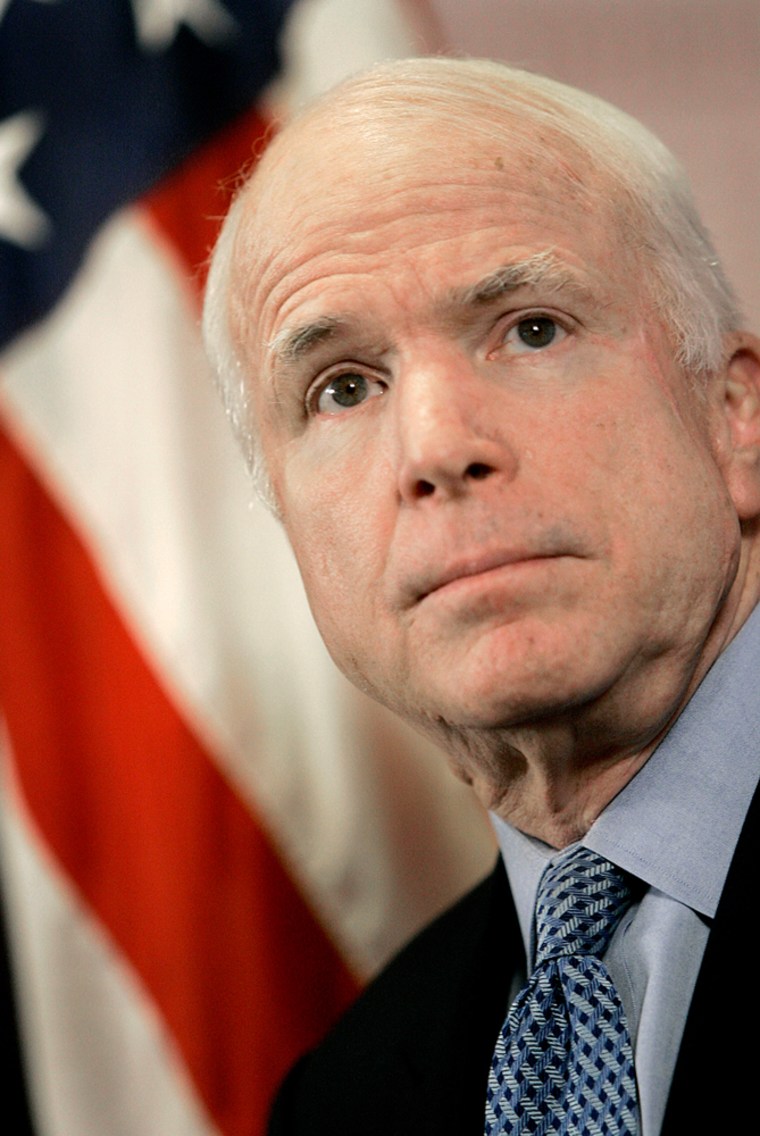Sen. John McCain, considered the front-runner for the 2008 Republican presidential nomination, intends to launch an exploratory committee next week, GOP officials said Friday.
The officials spoke on the condition of anonymity to avoid pre-empting a public statement from the four-term Arizona senator.
McCain, the GOP maverick who unsuccessfully sought his party’s nomination in 2000, already has opened a bank account for the committee, one official said.
“The senator has made no decision about running for president,” said Eileen McMenamin, a McCain spokeswoman.
Aides to McCain say the senator will discuss whether to seek the presidency with his family over the Christmas holiday, and make a final decision thereafter.
Establishing an exploratory committee allows a potential candidate to raise money for a White House run and travel the country.
McCain is a former Navy pilot who was a prisoner of war in Vietnam. He was elected to the Senate in 1986, and served in the House for four years before that.
Health issues?
If McCain were to run, he would turn 72 on Aug. 29, 2008, at the height of the campaign. Only President Reagan was older — 73 at the start of his second term. McCain’s health could be another issue. The senator has had several cancerous lesions removed from his skin.
Since losing to Bush in 2000, McCain has alternately challenged and embraced the president, building an independent reputation who isn’t afraid to speak his mind. At the same time, he’s sought to mend fences with conservatives he alienated in his first presidential run.
After Republicans lost control of both the House and Senate on Tuesday, McCain called for a return to the conservative principles he said make up the foundations of the Republican Party.
“We came to Washington to change government and government changed us,” lamented McCain. “We departed rather tragically from our conservative principles.”
He urged the party to return to a time when it was known for careful stewardship of tax dollars, less government, less regulation, lower taxes, a strong defense, as well as community and family values.
“I’m confident we will do that,” he said.
The Republicans’ loss of power in the Senate was a double blow to McCain, who had been in line to become chairman of the powerful Senate Armed Services Committee in January. The panel’s top post overseeing the military would have given him a high-profile platform during wartime and in the year leading up to 2008.
McCain has spent the past year padding his Straight Talk America political action committee with supporters in the early primary states of Iowa, New Hampshire and South Carolina, and he has broadened his inner-circle of advisers to include several strategists with ties to Bush.
Heavy into campaigning
During the 2006 election cycle, McCain worked to spread goodwill throughout the party, attending 346 events and raising more than $10.5 million on behalf of Republican candidates across the country. He also donated nearly $1.5 million to federal, state and county parties.
Bush must leave office after two terms, and there’s no shortage of Republicans and Democrats vying to replace him.
A full 15 months before the first primary contest in Iowa, McCain is considered the one to beat in a crowded field of potential GOP candidates. They include Massachusetts governor Mitt Romney, Senate Majority Leader Bill Frist of Tennessee, Arkansas Gov. Mike Huckabee, Sen. Sam Brownback of Kansas and former New York City Mayor Rudy Giuliani.
An Associated Press-AOL News poll conducted late last month found Secretary of State Condoleezza Rice, Giuliani and McCain were essentially tied for support. Rice has insisted that she will not run.
This year, McCain had taken steps to improve his relationship with conservatives, addressing a graduation class at Liberty University at the invitation of the Rev. Jerry Falwell, a former adversary.
War supporter after being a Bush critic
The Arizona senator has been a staunch supporter of Bush on the Iraq war. He has alienated conservatives, however, for opposing a constitutional amendment banning same-sex marriage and supporting federal expansion of embryonic stem-cell research.
When McCain sought the GOP nomination in 2000, he lost to Bush in a bitter campaign. Over the next four years, the deficit hawk rarely held his tongue, becoming a frequent critic of the Bush administration and gaining a reputation for bipartisanship.
In 2004, McCain showed his loyalty to the Republican Party when he campaigned for the president and rejected overtures from his Democratic friend and Senate colleague, John Kerry of Massachusetts, to run for vice president on a bipartisan ticket.
McCain stirred the pot throughout, defending Kerry when his patriotism was questioned and criticizing the president’s foreign policies.
